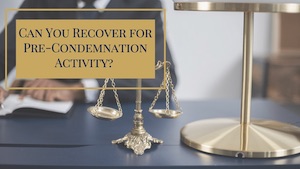
The acquisition of private property for eminent domain usually proceeds on a long timeline. Before the government actually uses eminent domain to acquire private property, there is a substantial amount of planning. During the pre-condemnation period, which can stretch for years, a governmental entity often has the opportunity to make land use decisions about the property that it intends to acquire.
While there is nothing out of the ordinary with making land use decisions pending condemnation, per se, it can become problematic when those decisions lower the value of the land that will eventually be taken. In those situations, there is a question about whether the property owner in that situation can recover from the diminution in value.
Unreasonable Delay is Compensable
Generally, both the federal and state constitutions protect a property owner from financial losses that result from public entity actions that impose disproportionate burdens on a property owner that are not shared equally by other members of the public. (U.S. Const., Amend. V; Cal. Const. Art. I, § 19; Klopping v. City of Whittier (1972) 8 Cal.3d 39, 51.)
Absent “unreasonable delay,” however, every property owner must suffer the risk of fluctuations in the value of their property before the governmental entity takes the property through the use of the eminent domain. (Guinnane v. San Francisco (1987) 197 Cal.App.3d 862, 870.)
Alternatively, where the property owner temporarily loses all use of their property because of unreasonable delay, then the owner may have a right to recover damages. (First English Evangelical Lutheran Church of Glendale v. Los Angeles County (1987) 482 U.S. 304, 316-322.)
Unreasonable Activity is Compensable
Similarly, a property owner may have a right to recover damages after the agency’s activities proceed into the acquisition phase and the governmental entity acts unreasonably. (Contra Costa Water Dist. v. Vaquero Farms, Inc. (1997) 58 Cal.App.4th 883, 898; Terminals Equipment Co. v. San Francisco (1990) 221 Cal.App.3d 234, 245-246.)
For example, a public entity may have inverse condemnation liability when it unduly restricts a property owner’s use of land. (Candlestick Properties, Inc. v. San Francisco Bay Conservation etc. Com. (1970) 11 Cal.App.3d 557, 572; City of Long Beach v. Airstrup (1958) 164 Cal.App.2d 41, 47.)
This is a fine line, however, and the restriction must be “unreasonable.” For example, the mere designation of land for future acquisition around the route, even though there may be an effect on the marketability of the property. (Selby Realty Co. v. City of San Buenaventura (1973) 10 Cal.3d 110, 120; Jones v. People (1978) 22 Cal.3d 144, 152.)
Conclusion
Ultimately, the question of unreasonable government activity in advance of condemnation requires a careful fact-specific inquiry into the nature of the government’s acts. If your property has been subject to questionable pre-condemnation activity, and the question of the reasonableness of a pre-condemnation activity is nuanced, then you may benefit from good legal advice on the topic.
If you find yourself confronted with eminent domain issues, or faced with defending an eminent domain suit, then please contact Underwood Law Firm, P.C. for an initial consultation.
Go here to get more details.
 California Partition Law Blog
California Partition Law Blog

